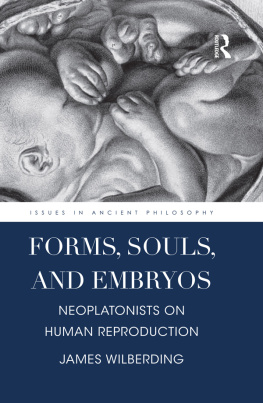THE NEOPLATONISTS: A READER
The Neoplatonist philosophers who flourished between the third and sixth centuries AD had a profound influence on western philosophy, on both Christian and Islamic theology, and on European literature and the visual arts from the Renaissance to modern times.
This extensively revised and updated second edition of The Neoplatonists provides a valuable introduction to the thought of four central Neoplatonic philosophers, Plotinus, Porphyry, Iamblichus and Proclus. John Gregory presents new translations of a selection of key passages from their writings together with concise explanatory essays, commentary and notes. The Neoplatonists: A Reader also contains an introduction contextualising the Neoplatonists writings and an epilogue detailing the legacy of Neoplatonist thought and the influence of its philosophy.
John Gregory is a freelance author and translator who previously worked as a teacher of classics and lecturer in philosophy. His previous publications include The Illustrated Bede and The Illustrated Columcille.
THE NEOPLATONISTS: A READER
Second edition
John Gregory
First published in 1991
by Kyle Cathie Ltd
This edition first published in 1999
by Routledge
2 Park Square, Milton Park, Abingdon, Oxon, OX14 4RN
Simultaneously published in the USA and Canada
by Routledge
711 Third Avenue, New York, NY 10017
1991, 1999 John Gregory
The right of John Gregory to be identified as the Author of this Work has been asserted by him in accordance with the Copyright, Designs and Patents Act 1988
All rights reserved. No part of this book may be reprinted or reproduced or utilized in any form or by any electronic, mechanical, or other means, now known or hereafter invented, including photocopying and recording, or in any information storage or retrieval system, without permission in writing from the publishers.
British Library Cataloguing in Publication Data
A catalogue record for this book is available from the British Library
Library of Congress Cataloging in Publication Data
Gregory, John, 1938
The Neoplatonists / John Gregory.
p. cm.
Includes selected translations from the works of Plotinus, Porphyry, Iamblichus and Proclus.
2nd ed.
Includes bibliographical references and index.
1. Neoplatonism. I. Title.
B517.G74 1998
186.4dc21 9825045 CIP
ISBN 0415187842 (hbk)
ISBN 0415187850 (pbk)
The Neoplatonists who appear in this selection of texts are the pagan philosophers, beginning with Plotinus, who gave a new direction to Platonic philosophy between the third and the sixth centuries of the Christian era. The word Neoplatonists is modern, reflecting the work of discriminating between the original philosophy of Platos dialogues and later schools of Platonism that has occupied scholars during the nineteenth and twentieth centuries. Previously, these philosophers were simply Platonists; they regarded themselves as the authentic interpreters of the Platonic tradition, and it was their version of Platonism that was to exercise deep and wide-ranging influence on the thought of future centuries.
Philosophically, the Neoplatonists continued the well-established practice of synthesising the thought of Plato with the other main schools of Greek philosophy; and they were themselves responsible for important innovations. The impact of their work on their own and succeeding ages, however, is due even more to its religious and moral idealism: to its conception of reality as spiritual activity or states of consciousness, and of the human soul as a voyager, fallen and encumbered by bodily existence, yet perfectible by a path of ascent to its divine origins. As such, the Neoplatonist movement held a unique appeal for the educated classes of the later Roman Empire, peculiarly adapted to the temper of its own and future ages. The teaching of Plotinus, coinciding with a period of material decline and religious anxiety unparalleled under the Roman Empire, has been described as the climax of a series of attempts to meet the supreme religious need of the later Hellenistic period by somehow bridging the gulf between God and the soul; to construct, that is to say, within the framework of traditional Greek rationalism a scheme of salvation capable of comparison and rivalry with those offered by the mystery religions (Dodds, 1963, p. xviii).
In their combination of a sophisticated philosophy with religious aspiration, the pagan Neoplatonists had only one serious rival Christianity; and, anti-Christian though they were, it was the incorporation of their ideas into Christian theology that ensured their permanent influence on European culture.
In the present century the Neoplatonists have had the good fortune to attract the attention of scholars who combine great depth of learning with a breadth of cultural interest and sympathy. Those from whom I have especially tried to profit are listed in the Bibliography.
In this revised edition the content of the Summary and References sections has been reorganised, and there are amendments and additions to the text. Some of these changes are in response to the suggestions of reviewers. I, of course, remain solely responsible for any errors and inadequacies.
J.G.
Plotinus, the philosopher of our time, seemed ashamed of being in a body. So begins the biographical essay by his disciple Porphyry, with a phrase that at once seeks to capture the spirit of Plotinus philosophy and to explain his reticence about his origins. He is said to have been born in AD 2045, but there is no reliable tradition concerning his ancestry or place of birth. He was wary of allowing his personality, rather than his philosophy, to become the focus of his followers loyalty, refusing to sit for his portrait and keeping secret his date of birth. Only one fact of his early life was confided to close friends, that his infantile compulsion to suck his nurses breast continued till the age of eight, finally surrendering to ridicule a detail of curiously modern interest.
Plotinus began his serious study of philosophy when in his late twenties, at Alexandria, the cosmopolitan centre of learning where western and eastern cultural influences coincided, and where a variety of philosophical schools were flourishing. His teacher for eleven years, Ammonius, is a shadowy figure who wrote no books, but we know that Plotinus became well-read in the works of Plato, Aristotle and their later commentators, and was familiar with the writings of other major schools of philosophy, notably the Stoics. Outside philosophy, also, his numerous quotations from the poems of Homer and allusions to Greek myth confirm his cultural background as thoroughly Greek.
In his thirty-ninth year, hoping to make acquaintance with the philosophy of Persia and India, he joined a disastrous military campaign against the Persians led by the Emperor Gordian III (23844 AD) and on its defeat escaped with difficulty to settle in Rome, where the rest of his lifes work was done. No evidence exists that Plotinus ever engaged in systematic study of eastern mystical thought, and modern scholars, when discussing the sources of his ideas, have differed considerably in the importance they have attached to the possibility of oriental influence.
In Rome, he moved among the ruling class, highly honoured by the Emperor Gallienus (25368 AD) and his wife Salonina, and his seminars were attended by senators; but he took no interest in politics, urging his followers to withdraw from public life and abandon worldly ambition. He once proposed to found a new city in southern Italy, named after Plato, where he could lead his students in retirement from the world to live by Platos Laws, but the project was thwarted by the opposition of courtiers.












